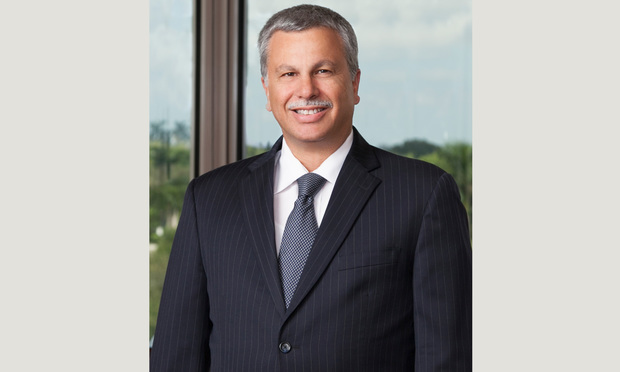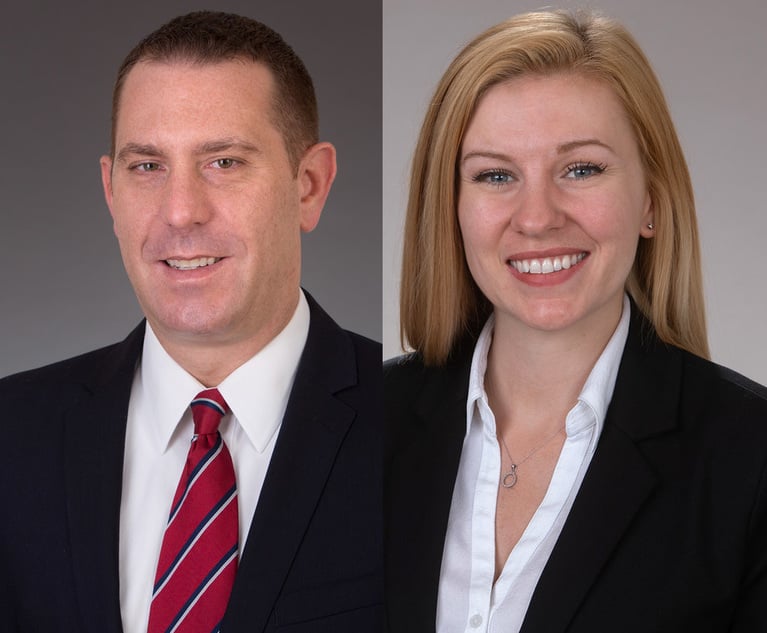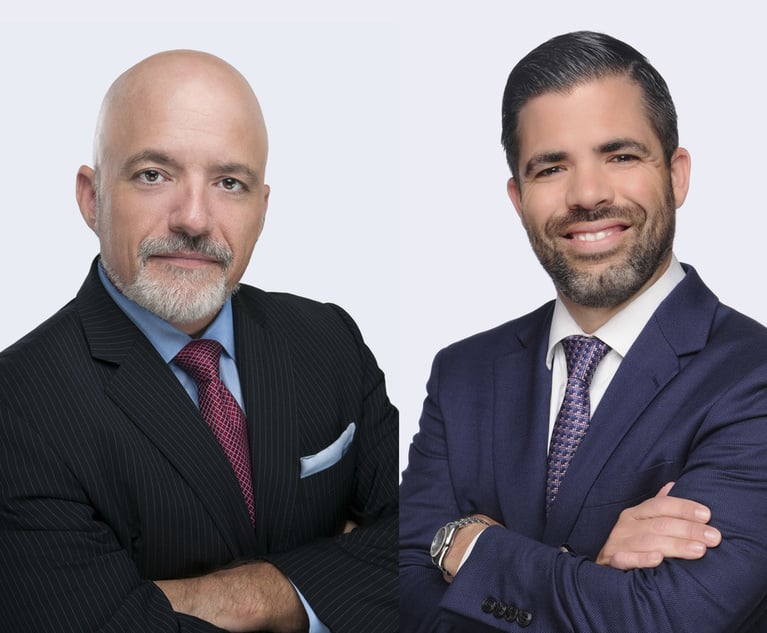The Coronavirus Conundrum: How Should Employers React?
The virus has been the lead story on most news networks for weeks now. It is a major topic of conversation on social media. People are cancelling travel in droves. Quarantine procedures have been put in place in most areas where outbreaks have occurred.
March 10, 2020 at 03:45 PM
6 minute read
 Angelo M. Filippi, Kelley Kronenberg partner in Davie, FL (Photo: Courtesy Photo)
Angelo M. Filippi, Kelley Kronenberg partner in Davie, FL (Photo: Courtesy Photo)
First, a little history lesson. Starting in Hong Kong and spreading throughout China and then into the United States, in 1957, the "Asian flu" pandemic became widespread in England where, over six months, 14,000 people died. A second wave followed in early 1958, causing an estimated total of about 1.1 million deaths globally, with 116,000 deaths in the United States alone. The last influenza pandemic occurred in spring 2009, when a novel influenza A (H1N1) virus, better known as "swine flu," emerged. It was first detected in the United States and spread quickly around the world. The Centers for Disease Control and Prevention (CDC) estimated that 151,700 to 575,400 people worldwide died from this infection during the first year the virus circulated.
The Avian flu, Zika and Ebola viruses all resulted in mainly localized concerns, and measures were enacted to limit the spread of these viruses. All resulted in epidemics, but none was considered a pandemic. According to the CDC, an influenza pandemic occurs when a novel influenza virus can be spread from person to person resulting in a global outbreak affecting a very large number of people. Another condition for a pandemic to occur is that most people will not have immunity to the new virus. The only currently existing pandemic is HIV (AIDS), which was identified in the 1980s and for which there is no known cure.
What is different about the coronavirus? Why are store shelves empty of masks and hand sanitizers? Why are people stocking up on water and toiletries? Why are the financial markets being influenced by news of the spread of the virus? Hysteria or prudence? The virus has been the lead story on most news networks for weeks now. It is a major topic of conversation on social media. People are cancelling travel in droves. Quarantine procedures have been put in place in most areas where outbreaks have occurred.
Amid this scenario, many workplaces are assessing options to address the need to continue operations, while at the same time protecting employees from the virus.
Employers are required by law to protect their workforce. The Occupational Safety and Health Act (OSHA) requires employers to maintain a safe workplace that safeguards them from "recognized hazards" to health or safety. Further, OSHA protects employees from retaliation, for example, when they refuse to show up for work, if they have a good faith belief that doing so would put them in imminent danger. Such a belief would arise, for example, when an employee has a condition that could create greater risk such as chronic respiratory impairments, pregnancy and or advanced age.
In the past, employers have sought to protect workers by, among other measures, mandating vaccinations, including, in some cases, yearly flu vaccines. While such a mandate does not violate the law, it requires careful construction of any policy. In 2012, an informal discussion letter from the Equal Employment Opportunity Commission's (EEOC) Office of Legal Counsel stated that an employer covered by the Americans with Disabilities Act (ADA) and Title VII of the Civil Rights Act, i.e., one that has more than 15 employees, cannot compel all employees to get flu shots, regardless of their medical condition or religious beliefs. The EEOC sued a hospital that would not hire a medical transcriptionist who refused flu shots on religious grounds. The government argued that the hospital refused to consider an acceptable alternative to the applicant that would have accommodated her religious beliefs and been effective. The alternative: wearing a mask.
Should an employer alert employees that a coworker has an infectious disease? To do so, would potentially create a claim under the confidentiality provisions of the ADA or state and local privacy laws. At the very least, the employer can, however, alert supervisory staff of the risk of contagion and require that the employee provide a doctor's note releasing him back to work. Further medical inquiry to assess the risk to an employee is likely prohibited. EEOC guidance issued during the swine flu pandemic warned employers that they could not inquire of employees whether they had a compromised immune system or chronic illness.
What are some other policy considerations? Employers may consider suspending disciplinary policies relating to absenteeism during the period of time during which the risk of contagion is high. The specter of discipline could result in reluctance of infected employees to call in sick, leading to exposure to other employees. Implementing relaxed leave policies, particularly as they relate to family members, could be considered. Mandatory leave when contagion risks are present can be implemented. Employers should contemplate the effects of school closures should the situation escalate.
A more difficult question arises when employees refuse to come into work due to an actual or perceived threat of infection. To be sure, individuals with disabilities that create a substantial risk if exposed to the virus can assert the right to accommodation if there is an actual risk of infection in the workplace. Temporary flexibility in work-from-home policies may be prudent if the risk grows. Moreover, employers should assess whether their infrastructure is adequate to support mass telecommuting should the authorities impose emergency closure in certain locations.
Communication is key. OSHA encourages employers to communicate to employees: job activities that may put them at risk of exposure; social distancing strategies; hygiene and protective equipment that reduce the risk; medical services available and a liaison to whom they can direct questions. A clear and comprehensive infectious disease policy is important. On the other side, employees can be directed to disclose travel destinations and the presence of viral infections in their household. They should be encouraged to communicate any concerns or questions regarding the company's plan should the virus be designated a pandemic. Let's hope that does not happen!
Angelo M. Filippi is a partner in the Fort Lauderdale office of Kelley Kronenberg, focusing his practice on employment and labor law and Occupational Safety and Health Act (OSHA) defense. He represents employers on a broad range of matters applicable to the workplace. Contact him at 954-370-9970 or [email protected].
This content has been archived. It is available through our partners, LexisNexis® and Bloomberg Law.
To view this content, please continue to their sites.
Not a Lexis Subscriber?
Subscribe Now
Not a Bloomberg Law Subscriber?
Subscribe Now
NOT FOR REPRINT
© 2025 ALM Global, LLC, All Rights Reserved. Request academic re-use from www.copyright.com. All other uses, submit a request to [email protected]. For more information visit Asset & Logo Licensing.
You Might Like
View All
Trending Issues in Florida Construction Law That Attorneys Need to Be Aware Of
6 minute read


Law Firms Mentioned
Trending Stories
Who Got The Work
J. Brugh Lower of Gibbons has entered an appearance for industrial equipment supplier Devco Corporation in a pending trademark infringement lawsuit. The suit, accusing the defendant of selling knock-off Graco products, was filed Dec. 18 in New Jersey District Court by Rivkin Radler on behalf of Graco Inc. and Graco Minnesota. The case, assigned to U.S. District Judge Zahid N. Quraishi, is 3:24-cv-11294, Graco Inc. et al v. Devco Corporation.
Who Got The Work
Rebecca Maller-Stein and Kent A. Yalowitz of Arnold & Porter Kaye Scholer have entered their appearances for Hanaco Venture Capital and its executives, Lior Prosor and David Frankel, in a pending securities lawsuit. The action, filed on Dec. 24 in New York Southern District Court by Zell, Aron & Co. on behalf of Goldeneye Advisors, accuses the defendants of negligently and fraudulently managing the plaintiff's $1 million investment. The case, assigned to U.S. District Judge Vernon S. Broderick, is 1:24-cv-09918, Goldeneye Advisors, LLC v. Hanaco Venture Capital, Ltd. et al.
Who Got The Work
Attorneys from A&O Shearman has stepped in as defense counsel for Toronto-Dominion Bank and other defendants in a pending securities class action. The suit, filed Dec. 11 in New York Southern District Court by Bleichmar Fonti & Auld, accuses the defendants of concealing the bank's 'pervasive' deficiencies in regards to its compliance with the Bank Secrecy Act and the quality of its anti-money laundering controls. The case, assigned to U.S. District Judge Arun Subramanian, is 1:24-cv-09445, Gonzalez v. The Toronto-Dominion Bank et al.
Who Got The Work
Crown Castle International, a Pennsylvania company providing shared communications infrastructure, has turned to Luke D. Wolf of Gordon Rees Scully Mansukhani to fend off a pending breach-of-contract lawsuit. The court action, filed Nov. 25 in Michigan Eastern District Court by Hooper Hathaway PC on behalf of The Town Residences LLC, accuses Crown Castle of failing to transfer approximately $30,000 in utility payments from T-Mobile in breach of a roof-top lease and assignment agreement. The case, assigned to U.S. District Judge Susan K. Declercq, is 2:24-cv-13131, The Town Residences LLC v. T-Mobile US, Inc. et al.
Who Got The Work
Wilfred P. Coronato and Daniel M. Schwartz of McCarter & English have stepped in as defense counsel to Electrolux Home Products Inc. in a pending product liability lawsuit. The court action, filed Nov. 26 in New York Eastern District Court by Poulos Lopiccolo PC and Nagel Rice LLP on behalf of David Stern, alleges that the defendant's refrigerators’ drawers and shelving repeatedly break and fall apart within months after purchase. The case, assigned to U.S. District Judge Joan M. Azrack, is 2:24-cv-08204, Stern v. Electrolux Home Products, Inc.
Featured Firms
Law Offices of Gary Martin Hays & Associates, P.C.
(470) 294-1674
Law Offices of Mark E. Salomone
(857) 444-6468
Smith & Hassler
(713) 739-1250






